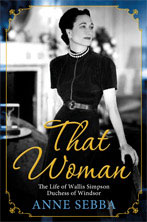I have just been to hear Anne Sebba talk about her book That Woman on the life of Wallis Simpson. This is one of a series of authors’ talks which we plan to make a more regular feature at The National Archives. Books should, and do, stand by themselves and sometimes seeing the author in the flesh can be a disappointment. Am I alone in thinking that Nigel Slater, possibly the greatest food writer today, worthy heir to Elizabeth David, should never, never be let near a television camera? However, this was a treat.

That Woman by Anne Sebba
Slightly spookily Anne’s dress almost exactly mirrored the one Wallis is wearing on the cover of the book but once over this I was captured by her words. Wallis Simpson’s story is extraordinary and Anne elaborated on her view of Wallis’ life: a tragic love story if not the one you’d expect. She read from letters Wallis wrote to her second husband Ernest at the time of the divorce which showed a woman trapped by her own schemes, horribly alone and in love with a man she can no longer have.
In putting the abdication crisis in its historical context Anne showed how horrified the royal family had been by Edward’s actions. The country had just come out of the First World War a time when the country had responded to a call to duty and paid with their lives, now ‘the family’ who have possibly the most engrained sense of duty ever, were looking to one of their own asking what they saw as a small thing and he wouldn’t do it. As you know there is nothing like the opprobrium heaped on someone by their own family if they think they are letting the side down. The mistresses, the weekend parties, the gin, the madness they could deal with all that –almost de rigeur for a king you might say- but one must step up to the plate and do your duty, not throw your toys out the pram if you can’t have ‘the woman you love’. In Anne’s final slide of Wallis’s coffin being carried out followed by members of the Royal Family, the look on the face of the Queen Mother said it all.
One of the most interesting aspects of an author’s talk is the insight it gives into the way writers work. Having trained as an historian and worked as a journalist Anne Sebba is a clear-eyed, analytical biographer but people’s lives are imbued with emotional baggage. It is the biographer’s task to cut through this and present reality but, to quote John Lennon, “reality leaves a lot to the imagination”. Anne described her research process: the mix of archives and interviews, of just following in the subject’s footsteps, breathing her air and, particularly exciting for us girls, of having the opportunity to wear some of the great bling. Wallis had one of the world’s most famous jewel collections, you’d hope so, she gave up a lot to get it.
I really enjoyed this talk and I’ll certainly be going to the next ones. First up on Thursday 27 September is Peter Barber, Head of Maps at the British Library, on London: A History in Maps. This physically beautiful book depicts London from the Roman age to today through the maps and plans used by the people who lived there. Step back in time and walk the streets seeing how the streets change over 500 years.
Then in October it is the turn of Paddy Ashdown and his book A Brilliant Little Operation. This one will be a gem. The Cockleshell Raid is just so fundamentally British. Lauded as a heroic blow against the enemy, it was ultimately futile – a potent mix of selfless if slightly eccentric individuals showing outstanding bravery but betrayed by incompetent bureaucracy – the sort of thing that makes you proud to be British. Lord Ashdown himself served in the Royal Marines Special Boat Service making him the ideal person to tell this fascinating story.
Come along, I guarantee you will learn so much. You can get your copies signed by the authors and, much though I hate to mention it, Christmas is coming (sort presents out now and you can wassail your way through December) and either of these books would be great gifts and it is always special to have (or give) a copy signed by the author.